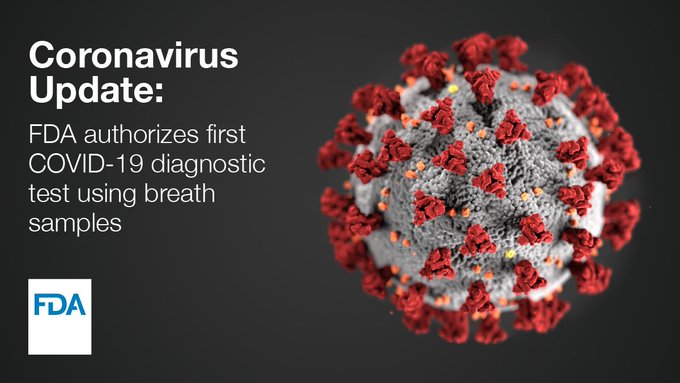
April 16, 2022 - The U.S. Food and Drug Administration has issued an emergency use authorization (EUA) for the first COVID-19 diagnostic test that detects chemical compounds in breath samples associated with a SARS-CoV-2 infection. The test can be performed in environments where the patient specimen is both collected and analyzed, such as doctor’s offices, hospitals and mobile testing sites, using an instrument about the size of a piece of carry-on luggage. The test is performed by a qualified, trained operator under the supervision of a health care provider licensed or authorized by state law to prescribe tests and can provide results in less than three minutes.
“Today’s authorization is yet another example of the rapid innovation occurring with diagnostic tests for COVID-19,” said Jeff Shuren, M.D., J.D., director of the FDA’s Center for Devices and Radiological Health. “The FDA continues to support the development of novel COVID-19 tests with the goal of advancing technologies that can help address the current pandemic and better position the U.S. for the next public health emergency.”
The performance of the InspectIR COVID-19 Breathalyzer was validated in a large study of 2,409 individuals, including those with and without symptoms. In the study, the test was shown to have 91.2% sensitivity (the percent of positive samples the test correctly identified) and 99.3% specificity (the percent of negative samples the test correctly identified). The study also showed that, in a population with only 4.2% of individuals who are positive for the virus, the test had a negative predictive value of 99.6%, meaning that people who receive a negative test result are likely truly negative in areas of low disease prevalence. The test performed with similar sensitivity in a follow-up clinical study focused on the omicron variant.
The InspectIR COVID-19 Breathalyzer uses a technique called gas chromatography gas mass-spectrometry (GC-MS) to separate and identify chemical mixtures and rapidly detect five Volatile Organic Compounds (VOCs) associated with SARS-CoV-2 infection in exhaled breath. When the InspectIR COVID-19 Breathalyzer detects the presence of VOC markers of SARS-CoV-2, a presumptive (unconfirmed) positive test result is returned and should be confirmed with a molecular test. Negative results should be considered in the context of a patient’s recent exposures, history and the presence of clinical signs and symptoms consistent with COVID-19, as they do not rule out SARS-CoV-2 infection and should not be used as the sole basis for treatment or patient management decisions, including infection control decisions.
InspectIR expects to be able to produce approximately 100 instruments per week, which can each be used to evaluate approximately 160 samples per day. At this level of production, testing capacity using the InspectIR COVID-19 Breathalyzer is expected to increase by approximately 64,000 samples per month.
Source: FDA
